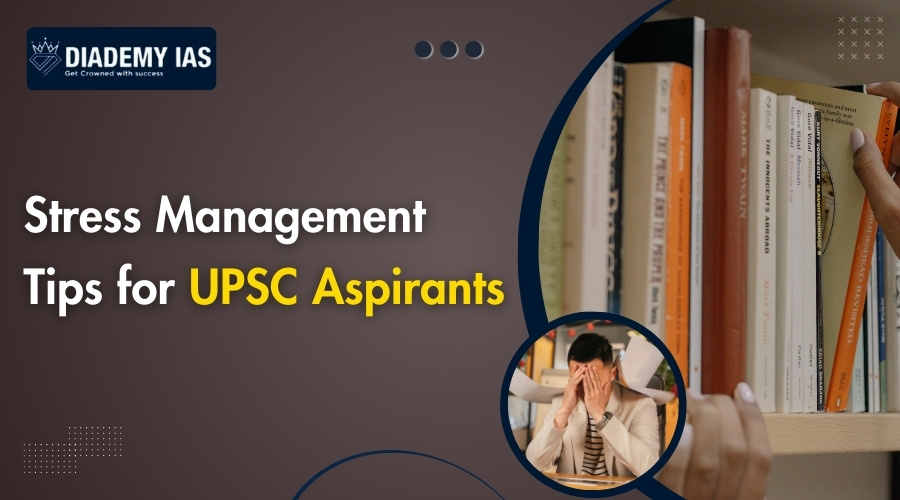Top Stress Management Tips for UPSC Aspirants
Feeling overwhelmed as a UPSC aspirant? Discover top stress management tips to excel in your exam prep and stay calm.

Master Stress, Ace UPSC Now!
Unlock expert tips to conquer stress and succeed in UPSC exam preparation.
Table of Contents
Preparing for the UPSC exam can be exciting, but it can also bring a lot of stress and pressure. This article will focus on stress management and how to handle the pressure that comes with UPSC preparation. It is very important to stay calm and focused during this time. When you learn how to manage stress, it helps you think clearly and do your best on the exam.
Why Handling Stress is Important
Managing stress is crucial because too much stress can make you feel tired and overwhelmed. For example, imagine trying to study for a big test but feeling so anxious that you can't concentrate. This can lead to poor performance, which can create even more stress. By learning to handle stress well, you can improve your studying and make the process a lot easier.
Overview of the Article
In this article, you will learn various strategies and tips for managing stress during your UPSC preparation. We will explore different stress relief techniques, discuss how to maintain your mental health, and give you some helpful UPSC exam tips. With the right tools, you can tackle your studies confidently and calmly!
Understanding Stress and Pressure
When preparing for the UPSC exam, many students face two big challenges: stress and pressure. Understanding what these mean can help you deal with them better.
Master Stress, Ace UPSC Now!
Unlock expert tips to conquer stress and succeed in UPSC exam preparation.
What is Stress?
Stress is how our body reacts when we feel overwhelmed. Imagine you have a big test coming up, and you haven't studied enough. You might feel worried, your heart might race, and you may even have trouble sleeping. This feeling is stress. It's your mind and body saying, “I need some help!”
What is Pressure?
Pressure is different from stress. It often comes from outside sources. For example, pressure to do well on your UPSC exam can come from your family, friends, or even your own hopes. You might feel like you need to study every hour of the day to be the best. This feeling can be heavy, but it’s not the same as stress. Pressure is about expectations, while stress is about how we feel when those expectations feel too much.
Effects on Mental Health
Both stress and pressure can affect our mental health. When we feel stressed, we might become anxious or tired. It can make it hard to focus on studying. If pressure builds up too much, it can lead to feelings of sadness or even burnout. It's important to recognize these feelings and take steps to feel better.
Strategies for Managing Stress
One great way to handle stress is through good time management. When you organize your study time, it can help you feel less anxious. Start by making a study schedule. Write down what subjects you will study each day and for how long. This way, you won’t feel rushed or confused about what to do next. Remember to include breaks in your schedule. Taking short breaks can help your brain rest and recharge!
Physical Exercise
Physical exercise is an excellent stress relief technique. When you exercise, your body releases chemicals that make you feel happier. You don't have to go to a gym; simple activities like walking, jogging, or even dancing can help. Try to spend at least 30 minutes a day doing some kind of exercise. It can be fun and a great way to let go of tension.
Mindfulness and Meditation
Mindfulness and meditation are helpful practices that reduce stress. Being mindful means focusing on the present moment and not worrying about the past or future. You can start with a simple meditation exercise. Sit in a quiet place, close your eyes, and take deep breaths. Count to four as you inhale and four as you exhale. Do this for a few minutes and notice how calm you feel afterward.
Healthy Diet
Eating a healthy diet is also important for your mental health. Balanced meals can make you feel more energetic and focused. Make sure to include fruits, vegetables, whole grains, and proteins in your meals. Foods like bananas and nuts can be great snacks that help keep your mood up. Drinking enough water is vital too. Staying hydrated can help your brain work better!
Handling Pressure During Preparation
Preparing for the UPSC exam can be exciting but also very stressful. It’s normal to feel pressure as you study hard and aim for success. Learning how to handle this pressure is important for doing well in your studies and keeping your mind healthy.
Positive Thinking
One of the best ways to manage pressure is to keep a positive outlook. When you think positively, you can feel more confident and less anxious. Try to focus on what you have achieved rather than what you haven't. You can write down three things you did well each day. This will help you see your progress and keep your spirits high.
Breaks and Relaxation
Taking breaks is very important when you feel pressure. If you study for too long without stopping, your mind can get tired. This makes it hard to focus. Make sure to take short breaks every hour or so. During your break, do something relaxing, like taking a walk or listening to your favorite music. Taking time to relax helps you feel refreshed and ready to study again.
Talking to Others
Sometimes, just talking about how you feel can help you handle pressure. Speak with friends or family about your worries. They can offer support and advice. It’s nice to know you’re not alone in this journey. Sharing your feelings can make you feel lighter and more at ease.
Set Realistic Goals
Setting small, achievable goals is key to avoiding feeling overwhelmed. Instead of thinking about everything at once, break your tasks into smaller pieces. For example, if you need to read a big book, set a goal to read just a chapter each day. This way, you can celebrate small wins, which will make you feel proud and less pressured.
Maintaining a Healthy Mindset
When preparing for the UPSC exam, keeping a healthy mindset is super important. Mental health plays a big role in how well you study and handle pressure. By focusing on some simple strategies, you can help yourself stay calm and think clearly as you get ready for the big day.
Consistent Sleep Schedule
One of the best ways to maintain a healthy mindset is by getting enough sleep. Sleep helps your brain rest and recharge. When you sleep well, you can remember what you studied better and feel more focused. Try to go to bed and wake up at the same time every day. This consistent sleep schedule will help your body get used to a routine, making it easier for you to feel rested and ready to learn.
Hobbies and Interests
Another great way to keep your mind fresh is by doing things you love. Engaging in hobbies and interests can help reduce stress. Whether it’s drawing, playing a sport, or reading your favorite book, taking time for yourself is important. These activities allow your brain to take a break from studying and can make you feel happier, which is good for your mental health.
Seeking Professional Help
Sometimes, stress can feel too big to handle alone. If you ever feel overwhelmed, it’s perfectly okay to seek help. Talking to a counselor or therapist can be really helpful. They are trained to support you and can give you tools to manage your feelings. Remember, asking for help is a sign of strength, not weakness.
Conclusion
In summary, handling stress and pressure during UPSC preparation is not just helpful but essential for success. By understanding the meaning of stress and pressure, you can take steps to manage them effectively. Remember, stress management is key. It affects your mental health, and learning stress relief techniques can make a big difference in your studies.
It’s vital to implement strategies like time management, physical exercise, mindfulness, and a healthy diet. These will help you feel calmer and more focused. Additionally, while preparing for the UPSC exam, pressure handling is equally important. Positive thinking, taking breaks, and setting realistic goals can keep you on track and feeling good.
Maintaining a healthy mindset throughout your preparation is a long-term goal. Keep a consistent sleep schedule, engage in hobbies that make you happy, and don’t hesitate to seek professional help if needed. By prioritizing your mental health, you will not only prepare better for the UPSC exam but also feel more confident and ready to tackle any challenges that come your way.
Master Stress, Ace UPSC Now!
Unlock expert tips to conquer stress and succeed in UPSC exam preparation.
Frequently Asked Questions (FAQs)
What are some quick stress relief techniques?
If you're feeling stressed, try some easy techniques to help you relax. Deep breathing is one of the best methods. Just take a deep breath in through your nose, hold it for a few seconds, and then breathe out slowly through your mouth. You can also take a short walk outside. Getting fresh air can clear your mind and boost your mood. Even stretching for a few minutes can help your body feel better!
How can I stay motivated during UPSC preparation?
Staying motivated can be tough during UPSC preparation. One great way is to set small goals for yourself. For example, you could aim to study a certain number of hours each day or finish a chapter by the end of the week. When you reach these goals, reward yourself with something fun, like watching your favorite show or enjoying a tasty snack. This will keep you excited and on track!
Can stress affect my performance in exams?
Yes, stress can really impact your performance in exams. When you're stressed, it can be hard to concentrate or remember what you've studied. This is why stress management is so important! By using techniques to handle pressure, like taking breaks and staying positive, you can help your brain work better when it matters most during your UPSC exams.



